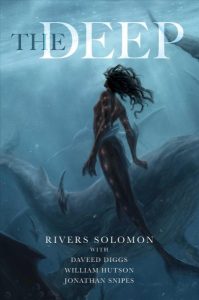 Rivers Solomon’s short novel The Deep is a riveting folkloric, afrofuturist novel that imagines a society of water-dwelling beings who descended from pregnant African women who were thrown overboard slave ships. This is by far the most interesting mermaid narrative I have ever read. The novella was inspired by a song of the same name by rap group clipping., which was inspired by the album Journey of the Deep Sea Dwellers by Drexciya– making Solomon’s work an interesting piece of communal storytelling (the audiobook is even read by Daveed Diggs, member of clipping.). Like Solomon’s other works, the protagonist in The Deep, Yetu, is on the outskirts of her society, rightfully angry at the ways it has wronged her, and yet filled with care and love for her people. Yetu has a special role in her society, she knows all of the history of her people. She knows this history because she is ‘gifted’ with the ability to see the past through the eyes of her ancestors, feeling and experiencing the past exactly as they did, no matter how traumatic. The rest of her people spend their daily lives unaware of their shared history, surviving mainly on instinct, as the painful history of their people is too much for them to bear as a whole society. Annually, they gather to experience the past through Yetu’s guidance, and she experiences three days of blissful ignorance. Yetu knows how important her role as historian is, but she can not bear to live in a society that brings such unbearable pain to one person to alleviate the suffering of the others. And still, as she grapples with this, she is forced to face the question: is ignorance really blissful? Is it better not to know the painful history of one’s past and be left with more questions than answers instead? Solomon writes a compelling narrative of responsibility, generational trauma, and identity reclamation in this short novel.
Rivers Solomon’s short novel The Deep is a riveting folkloric, afrofuturist novel that imagines a society of water-dwelling beings who descended from pregnant African women who were thrown overboard slave ships. This is by far the most interesting mermaid narrative I have ever read. The novella was inspired by a song of the same name by rap group clipping., which was inspired by the album Journey of the Deep Sea Dwellers by Drexciya– making Solomon’s work an interesting piece of communal storytelling (the audiobook is even read by Daveed Diggs, member of clipping.). Like Solomon’s other works, the protagonist in The Deep, Yetu, is on the outskirts of her society, rightfully angry at the ways it has wronged her, and yet filled with care and love for her people. Yetu has a special role in her society, she knows all of the history of her people. She knows this history because she is ‘gifted’ with the ability to see the past through the eyes of her ancestors, feeling and experiencing the past exactly as they did, no matter how traumatic. The rest of her people spend their daily lives unaware of their shared history, surviving mainly on instinct, as the painful history of their people is too much for them to bear as a whole society. Annually, they gather to experience the past through Yetu’s guidance, and she experiences three days of blissful ignorance. Yetu knows how important her role as historian is, but she can not bear to live in a society that brings such unbearable pain to one person to alleviate the suffering of the others. And still, as she grapples with this, she is forced to face the question: is ignorance really blissful? Is it better not to know the painful history of one’s past and be left with more questions than answers instead? Solomon writes a compelling narrative of responsibility, generational trauma, and identity reclamation in this short novel.


